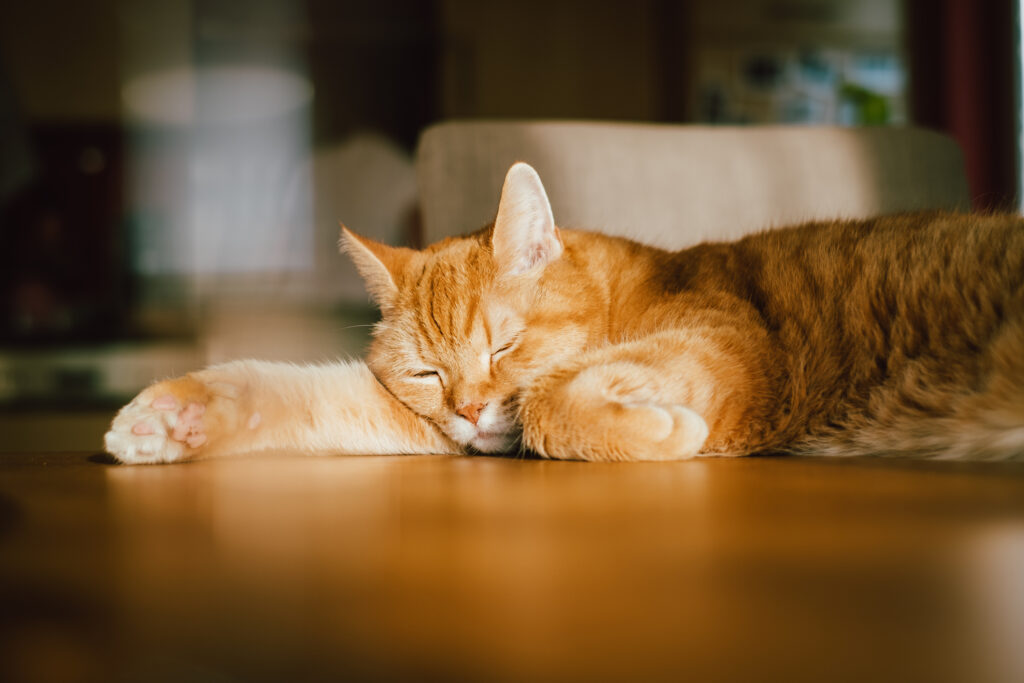
While lethargy can be a symptom of various conditions, it’s important to remember that only a qualified veterinarian, like those at Country Club Animal Hospital, can provide an accurate diagnosis. Here are some common reasons your cat might be lethargic:
Illness or Disease
Just like us, cats can have their “off” days due to health issues. But it’s more than just simple colds or sniffles that can keep them curled up in a corner. They could be grappling with a range of medical conditions that extend from digestive issues like inflammatory bowel disease to more alarming concerns like feline leukemia or diabetes. These health problems can seriously affect their mood and energy levels, making it vital to consult your vet if your kitty is more lethargic than usual.
Changes in Environment
It’s easy to forget that cats are creatures of habit. A sudden change in their living conditions—like moving to a new home, the arrival of a new furry family member, or even seasonal changes like winter setting in—can throw them off their game. It might cause stress or anxiety, which in turn can reduce their energy levels and desire to play or interact.
Aging
We all slow down as we age, and the same goes for your feline friend. Senior cats, typically those over 7 years old, tend to be less active and may spend more time napping. However, it’s critical not to write off sudden lethargy as “just something that happens” when cats get older. It could be indicative of age-related issues like arthritis, kidney problems, or even cognitive dysfunction syndrome, commonly known as cat dementia. Always consult your vet if there’s a sudden change in your senior cat’s activity level.
Dehydration or Malnutrition
What your cat eats—or doesn’t eat—has a direct impact on their vitality. An unbalanced diet lacking essential nutrients or dehydration due to inadequate water intake can rapidly deplete their energy levels. Signs of malnutrition or dehydration can include sunken eyes, a dull coat, and of course, reduced activity. If you suspect your cat is suffering from either, it’s crucial to reevaluate their diet and hydration habits and consult a vet for tailored advice.
When to Seek Veterinary Care for a Lethargic Cat
If you’re concerned about your cat’s lethargy, it’s always best to consult with a professional. If lethargy is accompanied by other signs like loss of appetite, vomiting, diarrhea, or changes in behavior, it’s crucial to seek veterinary attention immediately. A cat that’s lethargic for an extended period, say more than 24-48 hours, without any apparent reason should be checked by a vet. As a pet owner, you know your feline friend better than anyone else. If something doesn’t feel right, it probably isn’t. Always prioritize your cat’s health and well-being.
Always Prioritize Your Cat’s Health
Cats are experts at hiding their discomfort or pain, so lethargy might be one of the few visible signs that something is amiss. If you’re concerned about your cat’s well-being or simply want to learn more about their health, don’t hesitate. Reach out to Country Club Animal Hospital in Miami, FL, for expert advice and care. Remember, when in doubt, it’s always best to consult the professionals.
Call (305) 663-3300 for an appointment or use the online form to book an appointment. Your feline friend deserves the best care, and at Country Club Animal Hospital, that’s precisely what we offer.
